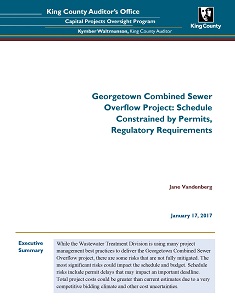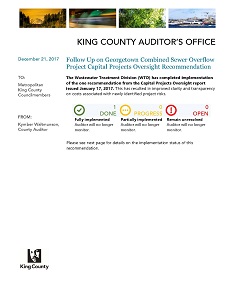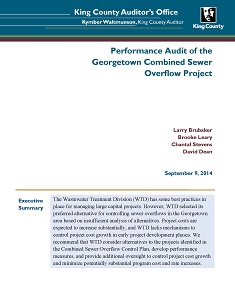Georgetown Combined Sewer Overflow Project: Schedule constrained by permits, regulatory requirements
January 17, 2017
NEW! Download the latest follow-up report
While the Wastewater Treatment Division is using many project management best practices to deliver the Georgetown Combined Sewer Overflow project, there are some risks that are not fully mitigated. The most significant risks could impact the schedule and budget. Schedule risks include permit delays that may impact an important deadline. Total project costs could be greater than current estimates due to a very competitive bidding climate and other cost uncertainties.
Current project summary
In general, the Wastewater Treatment Division (WTD) is using many project management best practices to deliver the Georgetown Combined Sewer Overflow project (Georgetown). However, there are continued challenges related to permitting and a very competitive bidding climate. The Georgetown project includes construction of a wet weather treatment station, conveyance pipe, and an outfall structure to control combined sewer overflows in the Brandon and Michigan drainage basins. These basins fall in the Georgetown and lower Duwamish neighborhoods.
WTD has not fully mitigated some project risks, particularly those risks driven by outside forces such as permits and easements. WTD has a comprehensive risk management plan that scores risks according to the probability of occurrence and the severity of impact. We are closely monitoring these risks:
- permits on critical path
- cost estimate allowances and adequacy of project contingency
- geotechnical/poor soils and historical artifact discovery
Constrained: WTD may be at risk of not meeting the consent decree milestone deadline of December 31, 2017. The current project schedule meets the consent decree milestone, but there are several critical permits that must be in place to move forward with procurement of the treatment station contract.
At Risk: While the current budget estimate is within the range of previous estimates, WTD may not have enough contingency to cover risks and cost uncertainties. WTD’s baseline cost estimate range is $192 million to $312 million1 including design, acquisition, permitting, and construction costs.
Verified: Independent reviews confirmed that a wet weather treatment station (WWTS) was a good approach, but the reviews occurred too late to allow any substantive change in approach without a renegotiation of the consent decree.
Recommendation 1: The Wastewater Treatment Division should update its risk based analysis of the adequacy of contingency to include ‘Buy American Steel,’ Seattle Department of Transportation improvements, and other recently identified cost risks.
Reports related to this audit
Click on the image(s) below to view related reports.
|
September 9, 2014 |
|
Audit team
Jane Vandenberg conducted this work. If you have any questions or would like more information, please call the King County Auditor's Office at 206-477-1033 or contact us by email KCAO@kingcounty.gov.

 Translate
Translate


